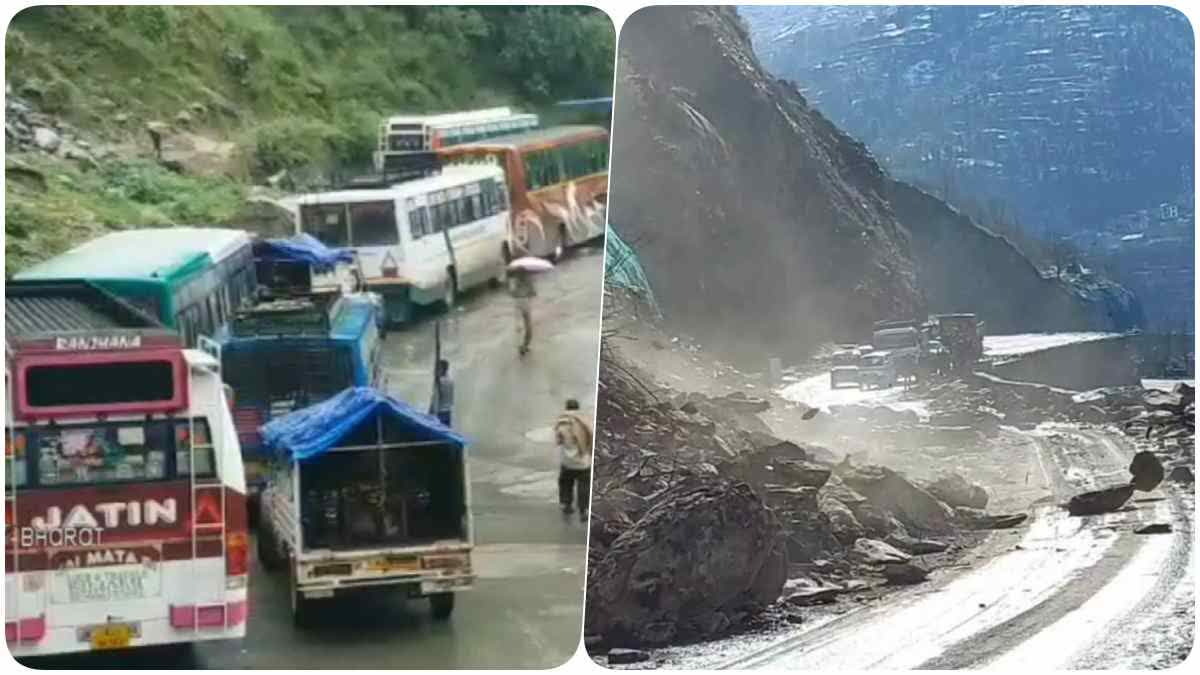Srinagar: The Srinagar-Jammu National Highway, the only artery connecting the Kashmir Valley with the rest of India, has been hit by frequent blockades, leading to the loss of seven months in the last five years, the official documents reveal.
The closure has hit not just trade but also commuters' time, including students, employers, patients, and those who wished to attend social gatherings hosted by relatives in the Valley or outside of Union territory. However, officials believe that the highway situation has improved since last year, reducing travel time between Jammu and Srinagar.
The 250-kilometre-long highway runs through the valley, and the Pir Panjal mountains are most prone to landslides, shooting stones in the mountainous terrain of the Ramban district. The 65-kilometre treacherous stretch from Banihal to Ramban is the most dangerous and frequently remains blocked during inclement weather. Spots like Kela Morh and Panthal Morh, falling in the Ramban tehsil, prone to landslides and shooting stones, are more dangerous, and accidents in this stretch have claimed many lives.
According to the information furnished by the Jammu and Kashmir Traffic Police to a Right to Information (RTI) activist, MM Shuja, the highway was blocked for 223 days since 2019, during which commuters and transporters lost 5413 hours of their travel time.
The highest amount of time lost since 2019 was 58 days (1458 hours) in 2023, while it was 41 days (989 hours) in 2022, 23 days (549 hours) in 2021, 47 days (1138 hours) in 2020, and 54 days (1279 hours) in 2019.
Abrar Ahmad, a prominent trade leader in Kashmir, said that the highway closure increases the transit time of goods, which causes loss to trade in the Valley. Citing an example, he said that a trader in Gujarat will need only 1 crore in capital to start his business, but in Kashmir, he will need 3 crores to set up the same business, as he will need more capital for transportation and logistics.
“We spend more money to transport goods into Kashmir as we are at the last periphery, and the highway is our only means of transportation. In other states, the transit time will be less as people don't face highway blockages there,” Abrar told ETV Bharat.
Bashir Ahmad Bashir, president of the Parimpora Fruit and Vegetable Market in Srinagar, said that the highway closure caused immense losses to the fruit and vegetable trade, but the situation has improved this year.
“Our most perishable items—fruits and vegetables—would get blocked in transit. This year, though, the highway situation remained. The higher authorities remained very concerned about the closure of the highway,” Bashir told ETV Bharat.
Many people would miss trains and flight schedules while students lost opportunities for admissions and examinations. Shamim Ahmad, a resident of Srinagar, regretted that last year his friend, along with his family, had come from Sri Lanka to attend his wedding. “He had booked return flight tickets from Jammu, but due to the highway closure, he missed the flight and had to arrange train tickets up to Delhi. He not only lost the money but also his valuable time,” Ahmad said.
The central government in 2011 approved a multi-crore project for widening the highway into a four-lane with a target of completing it in five years. The construction involved flyovers over the Chenab River traversing through the Ramban district and dozens of long and short tunnels. However, the completion target was not achieved as per its deadline and is still being executed.
Parshotam Kumar, the project director of the national highway, said that the situation of the highway has improved from last year, and the five-hour travel time will further come down to three hours after the completion of the highway.
“The 32-kilometre stretch between Ramban and Banihal was most vulnerable to closures; of this stretch, 16 kilometres is completed, and now construction is expeditiously going on in the remaining 16 km stretch. Widening into four lanes has been completed; only a few tunnels and flyovers are under construction. By June next year, the highway will be completed,” Kumar told ETV Bharat.
Read More



